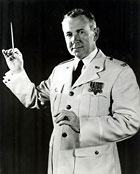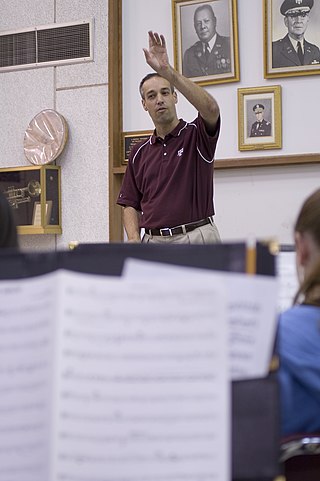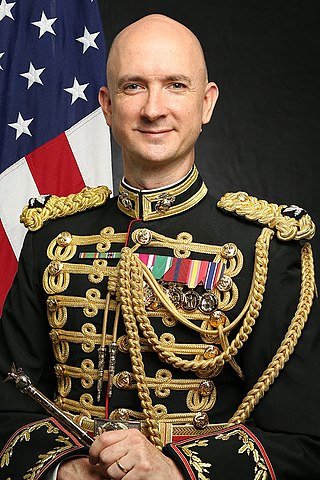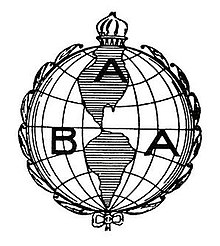
A concert band, also called a wind band, wind ensemble, wind symphony, wind orchestra, symphonic band, the symphonic winds, or symphonic wind ensemble, is a performing ensemble consisting of members of the woodwind, brass, and percussion families of instruments, and occasionally including the harp, double bass, or bass guitar. On rare occasions, additional, non-traditional instruments may be added to such ensembles such as piano, synthesizer, or electric guitar.

Edwin Franko Goldman was an American composer and conductor. One of the most significant American band composers of the early 20th century, Goldman composed over 150 works, but is best known for his marches. He founded the renowned Goldman Band of New York City and the American Bandmasters Association. Goldman's works are characterized by their pleasant and catchy tunes, as well as their fine trios and solos. He also encouraged audiences to whistle/hum along to his marches. He wrote singing and whistling into the score of "On the Mall".

Frederick Fennell was an American conductor and one of the primary figures which promoted the Eastman Wind Ensemble as a performing group. He was also influential as a band pedagogue, and greatly affected the field of music education in the US and abroad. In Fennell's New York Times obituary, colleague Jerry F. Junkin was quoted as saying "He was arguably the most famous band conductor since John Philip Sousa."
William Francis McBeth was an American composer, whose wind band works are highly respected. His primary musical influences included Clifton Williams, Bernard Rogers, and Howard Hanson. The popularity of his works in the United States during the last half of the twentieth century led to many invitations and appearances as a guest conductor, where he often conducted the premiere performances of some of his compositions, the majority of which were commissioned. His conducting activities took him to forty-eight states, three Canadian provinces, Japan, and Australia; and for a number of years he was principal conductor of the Arkansas Symphony Orchestra in the capital of Little Rock. At one time, his "Double Pyramid Balance System" was a widely used pedagogical tool in the concert band world.

Timothy Mahr is an American composer and conductor. He previously conducted the St. Olaf Band for 29 years before his retirement in 2023.
David Rex Holsinger is an American composer and conductor writing primarily for concert band. Holsinger is a graduate of Hardin-Central High School in Hardin, Missouri, Central Methodist University, the University of Central Missouri, and the University of Kansas.

Colonel George Sallade Howard was commander and conductor of The United States Air Force Band between 1947 and 1963.
Harvey Gene Phillips, Sr. was an American tuba player. He served as the Distinguished Professor of the Jacobs School of Music at Indiana University, Bloomington and was dedicated advocate for the tuba becoming popularly known as Mr. Tuba.

Albert Austin Harding was the first Director of Bands at the University of Illinois and the first band director at an American university to hold a position of full professorship. The Harding Band Building, the first dedicated building for a University Band Department, was named for him.

Dr. Timothy Brett Rhea is director of bands and music activities at Texas A&M University. As director of bands, he leads the university band program, serves as conductor of the Texas A&M Wind Symphony, and coordinates the Fightin' Texas Aggie Band marching band. As director of music activities, he administratively oversees the activities of the jazz, orchestra, and choral programs. Rhea also served as the 79th president of the American Bandmasters Association from 2016-2017.
Joseph W. Hermann is a leading American wind band conductor and educator and is currently Director of Bands and Professor of Music at Tennessee Technological University in Cookeville, Tennessee. He is also the current President of the American Bandmasters Association.
Charles O'Neill was a Canadian bandmaster, composer, organist, cornetist, and music educator of Scottish birth and Irish parentage. Although he wrote many symphonic and choral works, the majority of his compositional output was devoted to band music.
Steven Bryant is an American composer and conductor. His catalog of works includes pieces for orchestra, wind ensemble, electronics, and chamber music. Bryant states: "I strive to write music that leaps off the stage to grab you by the collar and pull you in. Whether through a relentless eruption of energy, or the intensity of quiet contemplation, I want my music to give you no choice, and no other desire, but to listen."

Ernest S. Williams was a prominent American band conductor, cornet soloist, composer, and music educator.
Maurice Clark McAdow was an American conductor, trumpeter, and music educator who served as director of bands at the University of North Texas College of Music for 29 years, from fall 1945 to spring 1975. The concert bands under his direction were acclaimed for performing a wide repertoire that exhibited advanced levels of musicianship commensurate with a major music school. The marching bands under his direction were known for innovative and colorful halftime shows. Since the mid-1940s, the College of Music had been, and still is, among the nation's largest music schools. Due to the size of the music school, his marching bands were filled with an unusual number of music majors, sometimes exceeding 90%.
Jerry Junkin is an American conductor of wind bands and educator. Junkin serves on the faculty of the Butler School of Music at the University of Texas at Austin where he holds the Vincent R. and Jane D. DiNino Chair for the Director of Bands. He conducts the University of Texas Wind Ensemble and instructs graduate as well as undergraduate conducting courses. Additionally, Junkin has served as the conductor of the Dallas Wind Symphony since 1993.
Frank Bencriscutto, nicknamed "Dr. Ben," was an American conductor and composer of concert band music. Bencriscutto was Director of Bands and Professor of Music at the University of Minnesota for thirty-two years.
"On the Mall" is a famous march composed by American bandmaster Edwin Franko Goldman (1878–1956). It vies with Goldman's "Chimes of Liberty" as his two most popular compositions. "On the Mall" still in 2013, as indicated by Jack Kopstein, remains a featured march and continues to be performed and recorded by bands throughout America and around the world.
Donald Earnest Caneva was an American internationally renowned, third generation band director, conductor, music editor, festival founder and band music educator.

Jason K. Fettig is a band director, conductor, and former Marine colonel who currently works as Director of Bands at the University of Michigan. Before his hiring, he served as the 28th director of the United States Marine Band and music adviser to the President of the United States.









